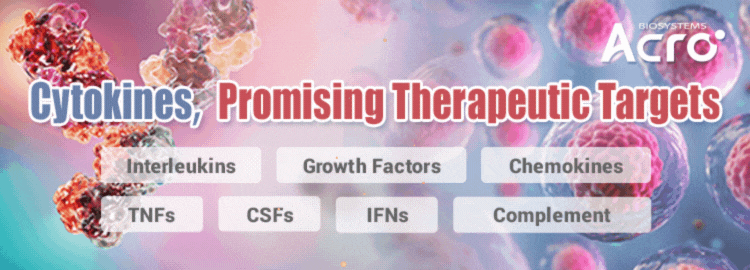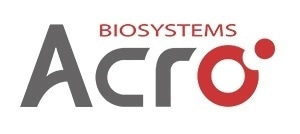Autoimmune diseases represent the second largest global disease market after cancer. The global market for autoimmune disease drugs was worth $132.3 billion in 2022, with its value projected to grow to $176.7 billion by 2030.
The size of this market and its anticipated growth have led to the autoimmune sector becoming extremely competitive and a field that many major pharmaceutical companies are actively pursuing.
This article explores the connection between cytokines and other widespread autoimmune diseases.
The Role of cytokines in Psoriasis, Type 1 Diabetes and Inflammatory Bowel Disease
Psoriasis

Image Credit: ACROBiosystems
Type 1 Diabetes

Image Credit: ACROBiosystems
Inflammatory Bowel Disease

Image Credit: ACROBiosystems
Psoriasis
Psoriasis (PS) is a chronic inflammatory skin disease commonly linked to abnormal expression of a range of cytokines and immune system dysfunction. Detailed insight into the intervention of abnormal cytokine expression is key to better understanding disease progression and the development of more effective treatments.
Overproduction of tumor necrosis factor-α (TNF-α) can result in an abnormal proliferation of skin cells and an exacerbation of the inflammatory response. This can then lead to the formation of PS lesions.
Abnormal expression of interleukin-23 (IL-23) can lead to immune cell activation, further triggering an inflammatory response and resulting in the formation of PS lesions.
Interleukin-17 (IL-17) also promotes the development of PS lesions by aiding in the production of inflammatory mediators, further exacerbating an inflammatory response.
A range of therapeutic drugs have been used in the treatment of PS, including the anti-TNF-α drug Etanercept, the anti-IL-23 drug Risankizumab, and the anti-IL-17 drug Bimekizumab.
These drugs have the potential to relieve PS symptoms and reduce the prevalence of lesions by modulating the immune response, reducing inflammation, and inhibiting abnormal skin cell proliferation.
Type 1 Diabetes
During the development of the chronic autoimmune disease Type 1 Diabetes (T1D), cytokines play a critical role in the coordination of complex multicellular interactions between pancreatic β cells and immune cells. This interaction makes cytokines an ideal potential target for immunotherapeutic interventions.
Cytokines such as TGF-β, IL-5, IL-4, IL-2, IL-10, IL-15, IL-33 and IL-35 have the potential to induce regulatory phenotypes in immune cells, releasing anti-inflammatory cytokines and resulting in beneficial anti-inflammatory and immunoregulatory effects.
In T1D, pro-inflammatory cytokines such as IL-6, TNF-α, IFN-α, IL-17 and IL-21 have the potential to amplify inflammation via the proliferation and activation of immune cells.
Due to their pleiotropic nature, any given cytokine (for example, IL-15) can prompt the activation of both diabetogenic and regulatory immune cells. B cells are also known to express high levels of cytokine receptors (including IL-1R, IL-4R and IL-22R) while also showing evidence of increased sensitivity to cytokines.
Low-dose IL-2 has been found to favor the development of the Treg population, helping to control the onset and progression of T1D. This has been highlighted in a number of relevant studies.
Inflammatory Bowel Disease
Inflammatory Bowel Disease (IBD) also includes Ulcerative Colitis and Crohn’s Disease. The pathogenesis of these diseases typically involves the abnormal expression of different cytokines and immune system dysregulation.
In IBD, TNF-α and a number of different interleukin family proteins are involved in the intestinal inflammatory response, immune dysregulation, and mucosal damage.
For example, IL-1 is a factor in the proper regulation of inflammatory responses, and its overproduction may lead to the aggravation of inflammation and even intestinal damage in patients with IBD.
IL-6 is involved in immune responses and the regulation of inflammation, and its high expression is linked to disease activity and severity. Pro-inflammatory cytokines such as IL-12 and IL-23 are known to participate in intestinal mucosal damage as well as the inflammatory response.
Increased expression of IL-17 has been found to show a positive correlation with IBD. The modulation of these cytokines has, therefore, become a vital strategy in the ongoing treatment of IBD.
ACROBiosystems’ solutions for autoimmune disease treatment
ACROBiosystems offers a wide range of recombinant cytokines and their receptors, including interleukins, chemokines, growth factors, TNFs, CSFs, IFNs, and complement components.
All of these products offer high bioactivity, high purity, and high batch-to-batch consistency - key factors in the acceleration of development programs for autoimmune disease drugs.

Image Credit: ACROBiosystems
More reagents better support users’ experimental needs
The company has recently launched ClinMax™ - comprehensive ready-to-use ELISA kits with meticulous quality control. These kits ensure that analysis results are precise, stable, and consistent, allowing users to better meet their experimental requirements.

Image Credit: ACROBiosystems
Acknowledgments
Produced from materials originally authored by ACROBiosystems.
About ACROBiosystems
ACROBiosystems is a cornerstone enterprise of the pharmaceutical and biotechnology industries. Their mission is to help overcome challenges with innovative tools and solutions from discovery to the clinic. They supply life science tools designed to be used in discovery research and scalable to the clinical phase and beyond. By consistently adapting to new regulatory challenges and guidelines, ACROBiosystems delivers solutions, whether it comes through recombinant proteins, antibodies, assay kits, GMP-grade reagents, or custom services. ACROBiosystems empower scientists and engineers dedicated towards innovation to simplify and accelerate the development of new, better, and more affordable medicine.
Sponsored Content Policy: News-Medical.net publishes articles and related content that may be derived from sources where we have existing commercial relationships, provided such content adds value to the core editorial ethos of News-Medical.Net which is to educate and inform site visitors interested in medical research, science, medical devices and treatments.